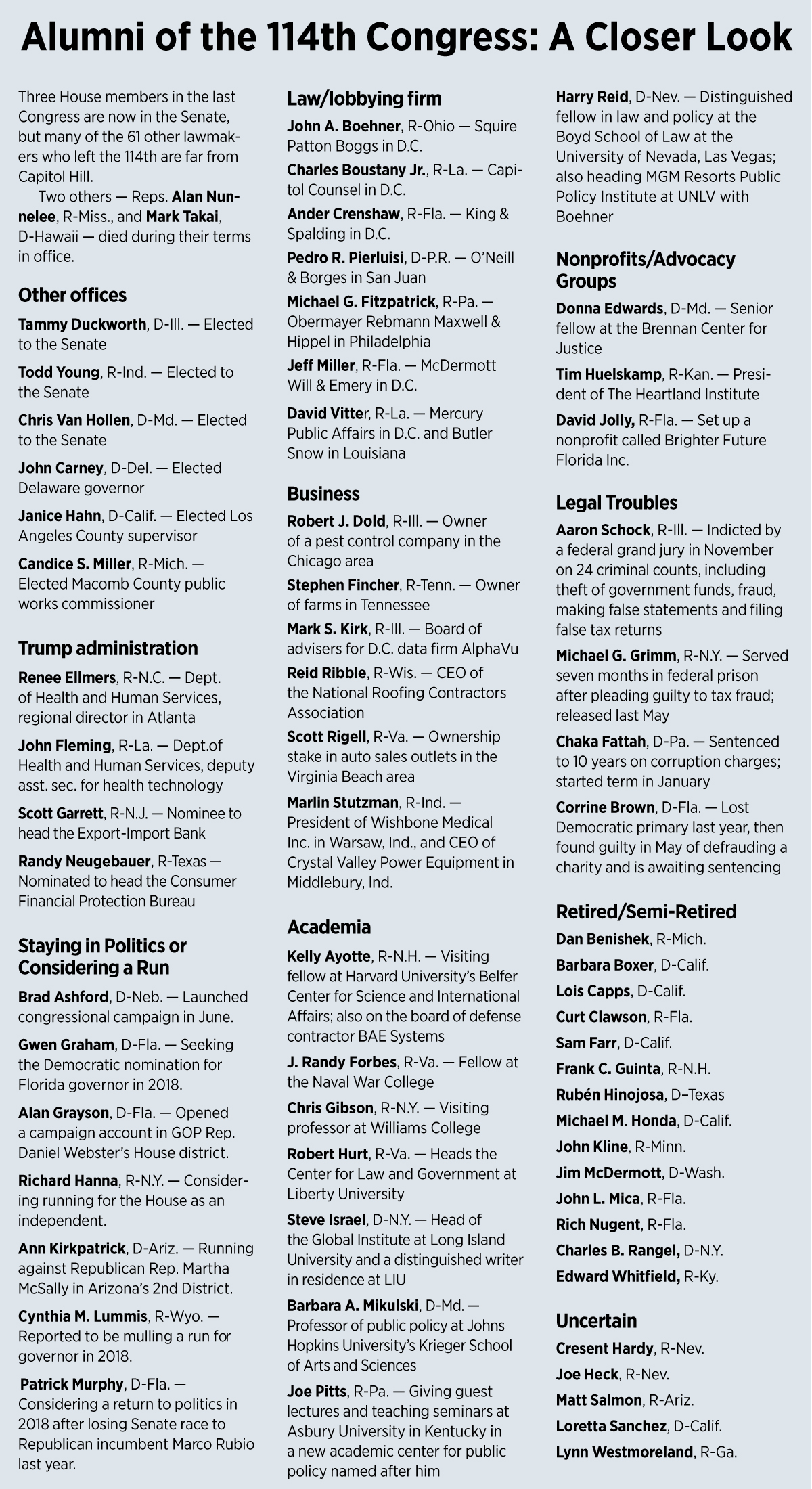Lobbying After Congress Declines in Popularity
Roll Call looks at what alums of the 114th Congress are up to

By KYLE STEWART and GRIFFIN CONNOLLY
Whether it was the ascension of Donald Trump, the endless vitriol of today’s politics or other factors, former members of the 114th Congress departed Washington in droves, a marked difference from previous Congresses when the most popular destinations for former members were D.C. lobbying firms.
Two years ago, a survey of 64 former members of the 113th Congress found that 24, more than a third, chose the familiar route of joining a law, lobbying or consulting firm. This time around, of another group of 64 from the last Congress, only five have joined Washington firms, and one of those — former House Speaker John A. Boehner — said he is not engaged in lobbying. Two other ex-members joined law firms outside of Washington.
Another surprising finding in this year’s “Where Are They Now?” analysis is that academia is now a more popular destination than lobbying: Twice as many former members this time accepted posts at colleges and universities (eight) as did lawmakers from the 113th Congress in 2015 (four).
The bottom line is that for whatever reason, ‘Inside the Beltway’ seems to be far less attractive for life after Congress than it used to be.
“I’m still involved in politics, but I’m really glad I’m not there,” said Democrat Barbara Boxer, who has settled back into her Southern California home after 10 years in the House and 24 years in the Senate. “I think my timing was impeccable, just knowing the kind of person I am, because I would have been so frustrated at the lack of progress, that I would have been unhappy. I can do more from the outside.”
Boxer now spends her time making speeches and engaging in political forums, blogging and tweeting on social media and running the newly formed PAC for a Change, which has already raised more than $1.3 million for Democratic candidates.
Another of Boxer’s Democratic colleagues from the Senate, Barbara A. Mikulski of Maryland, took a position teaching public policy at Johns Hopkins University’s Krieger School of Arts and Sciences, mainly because, at 81, she said, “I really want to pass on what I know” to young people.
She said she has found them to be “passionate about how to go from protest to real policy change.” Mikulski started her career as a social worker in Baltimore and went on to serve 10 years in the House and 30 years in the Senate before retiring last year.
“This, for me, isn’t like nostalgia or cute and quaint war stories, it’s about kind of the rules of the road for social change,” she said.
Part of the reason fewer lawmakers are going into lobbying is that the industry itself is a bit shell-shocked these days, said Julian Ha, leader of Heidrick & Struggles’ government affairs and trade association practice, which recruits executives for K Street offices.
“There’s a lot of ‘deer in the headlights’ going on,” Ha said. “People query whether there’s even a way to get things done, when the first six months of the new administration has been nothing but rolling back laws and regulations. … If they don’t see anything changing they’re not going to staff up.”
Staying involved
Some former lawmakers, though, still believe their best contributions can be made inside Washington, even while outside of Congress.
Republican Ander Crenshaw of Florida, who served eight terms in the House before retiring, joined the D.C. lobbying firm King & Spalding, where he counsels clients on the impact of regulations and legislation on health care, defense and finance. Crenshaw worked in law and investment banking before he was first elected to Congress in 2000: “Those are the three things that help me bring an interesting, unique perspective,” he said.
Former Republican Sen. David Vitter, who lost a bid for governor of Louisiana in November 2015, is splitting his time between Washington, at Mercury Public Affairs, and his home state, where he is counsel with the law firm Butler Snow. Vitter is working on issues he championed in Congress, including energy and chemical regulation.
“I’m really enjoying what I’m doing in a very positive, forward-looking sense,” Vitter said. “So I’m very happy.”
Two House Republicans who lost elections last year are continuing public service as a result of White House appointments. Renee Ellmers, who lost a GOP primary in North Carolina, was named regional administrator of the Department of Health and Human Services in Atlanta, and John Fleming, an unsuccessful candidate for the Senate seat vacated by Vitter, was named HHS deputy assistant secretary for health information technology reform.
A few other ex-House members opted to continue in government at the local or state level: Republican Candice S. Miller was elected public works commissioner in Macomb County, Michigan, Democrat Janice Hahn won a seat on the Los Angeles County Board of Supervisors, and Democrat John Carney was elected governor of Delaware.
Academia calls
But for others, being away from the political fray is a welcome respite.
“When I look at my schedule and I don’t see ‘call time’ [for fundraising] and I look at my schedule and I don’t see ‘endless markup in committee,’ I relish it,” said former Rep. Steve Israel, a New York Democrat who chaired the Democratic Congressional Campaign Committee from 2011 to 2015. “There’s a freedom that I’m experiencing.”
Israel is now head of the Global Institute at Long Island University and a distinguished writer in residence at LIU, having just finished copy edits for his second book, “Big Guns,” a satirical novel hitting the shelves next April about the gun lobby and life in Washington.
Another New Yorker, former GOP Rep. Chris Gibson, is teaching classes at Williams College in Massachusetts, including one entitled “America First? The Trump Era and the Future of World Politics.”
“Moving to academia will allow me to make a meaningful contribution teaching and publishing while balancing family commitments,” Gibson said in a statement when he took the position last spring.
Before his first election to Congress in the tea party wave of 2010, Gibson spent 24 years in the Army and retired as a colonel.
Former Senate Democratic leader Harry Reid of Nevada also entered the ivory tower of academia, as the first distinguished fellow in law and policy at the Boyd School of Law at the University of Nevada, Las Vegas. Reid is also leading the MGM Resorts Public Policy Institute at UNLV along with Boehner, who left the 114th Congress in October 2015.
Asked by the Las Vegas Sun in May why he moved to academia, Reid was characteristically blunt. “They asked me to do it,” he said. And he was uncharacteristically reticent when asked to comment on Trump.
“I’m happy to talk to you about a lot of things, but I don’t want to talk to you about Trump,” Reid said. “I’ve said all I’m going to say about Trump because I can’t say anything good.”
Policy influencers
Reid’s former Democratic colleagues, Boxer and Mikulski, are channeling their angst about Trump into helping candidates who oppose his policies — Boxer through her PAC and Mikulski by working with two groups encouraging women to run for local, state and federal offices.
“I have a platform and I have my PAC and I’m helping people who are gonna fight back,” Boxer said. “I didn’t leave because I was frustrated. I left because I wanted to continue my work in another venue and that’s what I’m doing.”
A Republican senator who lost a re-election bid last year, Mark S. Kirk of Illinois, has kept one foot in D.C., as an advisory board member for the data company AlphaVu. Kirk said he sees the work as a new form of political involvement because the firm is able to “cut through the chatter to tune into important conversations, identify advocates and build networks designed to capture and influence public opinion.”
Republican Reid Ribble, who rode the 2010 tea party wave into the House but decided to step down after three terms, is back in Wisconsin spending more time with his four grandchildren, but he has a role in government as the new CEO of the National Roofing Contractors Association.
“Having spent 30-plus years in the roofing business, this is where all my friends are,” Ribble said. “There’s almost a salt-of-the-earth dynamic to these folks. They’re all entrepreneurs, doing honest, meaningful work to provide for their families, and they’re always making progress toward a final product.”
It’s almost the opposite of what’s happening in Washington these days, Ribble said. “Even though my colleagues in Congress are working at a chaotic, frenetic pace, it’s not really feeling like anything’s getting accomplished,” he said. “I would be going crazy right now.”
Former Rep. Tim Huelskamp, a Kansas Republican who lost a 2016 primary race, is also staying involved — from his base in the Midwest. Huelskamp said he hasn’t been back to Washington since January. “No reason to go back,” he said. “My home, my heart, my farm and family has always been in Kansas.”
Yet Huelskamp, 48, has an eye on his future. This month he became president of The Heartland Institute, a conservative think tank headquartered near Chicago, and he has filed papers to raise money as a candidate in Kansas’ 1st District next year.
‘That was enough’
Then there are those who are simply enjoying retirement.
Former GOP Rep. Dan Benishek of Michigan is one of them. On the day CQ Roll Call reached him for an interview, Benishek had just hauled home on the back of his trailer a ton of concrete blocks he plans to use to build a wood-fired pizza oven.
He said he’s savoring his days around the house. “The district I was in required me to be on the road whenever I came home,” he said. “Sometimes, it’d be months I didn’t sleep at home.”
“This [retirement] has been really good. I’m really happy with it,” he said.
Asked if he missed being part of the action in Washington, Benishek replied: “I miss the clowns, but I don’t miss the circus. I’ve got all my friends there. They’re all wonderful people there, very dedicated. But this is not my career. I did this because I was worried about the country, worried about the Obama presidency. I gave ’em six years, but that was enough for me.”

Mike Magner contributed to this report.





